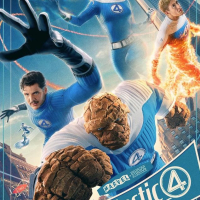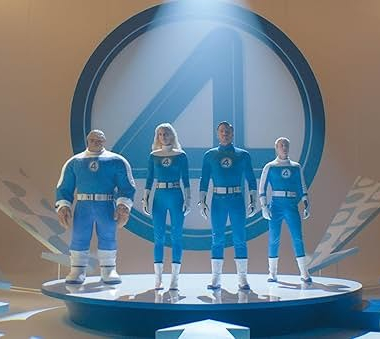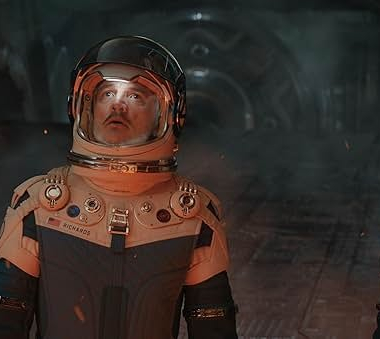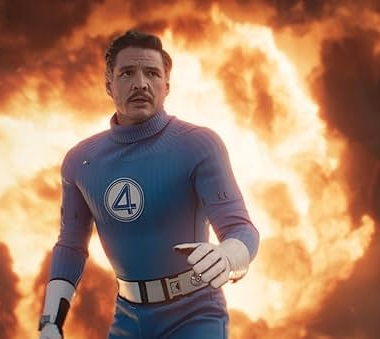The Fantastic Four: First Steps Review
The Fantastic Four: First Steps rockets out of Marvel’s vault with a confidence and creativity that doesn’t just reboot the team—it redefines what a mainstream superhero epic can be. Under Matt Shakman’s nimble direction, this new chapter sets Phases Six of the MCU spinning in a bold new direction: one that’s richly stylized, bracingly optimistic, and refreshingly unafraid to tackle both era-specific wonder and the modern anxieties of leadership and legacy.
Time-Shifted Setting with Purpose
From the opening sequence, the film’s commitment to its 1960s-inspired alternate Earth is total. This isn’t nostalgia for nostalgia’s sake; it’s a living, breathing world where brilliant scientists and astronauts are superstars, the skyline bristles with futuristic optimism, and retro aesthetics pulse with life. Unlike the usual superhero landscapes, New York is suffused with pastel color, chrome accents, and vintage buzz, all swirling in a collective faith that technology and intellect can sustain peace. The Baxter Building gleams not just as a headquarters, but as a central pillar of public confidence.
Instead of rehashing origins, the film dives straight into the Fantastic Four as established legends—much like celebrity astronauts. The world’s trust in them is woven not just into public parades and news broadcasts, but into the city’s personality. Reed, Sue, Ben, and Johnny are not outliers—they are the very core of their era’s optimism.
Innovative Ensemble: Humanity First, Powers Second
Pedro Pascal’s Reed Richards isn’t the emotionally distant archetype fans might expect; rather, he’s rendered here as a sometimes anxious, always curious, deeply empathetic father-in-waiting and polymath. This version of Reed is moved not by ego, but by a heavy sense of stewardship—his awe at impending fatherhood matched only by his uncertainty about the fate his genius might unleash.
Vanessa Kirby’s Sue Storm is a revelation: poised, strategic, yet constantly wrestling with the contradictions of being a savior and a prospective mother. Her leadership is never questioned, her emotional range never forced. It’s a performance that restores Sue to the heights her comic roots demanded.
Ebon Moss-Bachrach’s Ben Grimm, captured via cutting-edge motion capture, is more than a tank with a heart—he breaks open The Thing archetype with a performance that’s tough, sarcastic, and achingly vulnerable. As for Joseph Quinn’s Johnny Storm, he reignites the Human Torch through a nuanced lens, his bluster and showmanship layered over a deeply buried longing for approval and self-worth.
Cosmic Menace, Human Tension
Galactus, interpreted by Ralph Ineson, is less a villain than a force of nature—a literal planetary reckoning clad in regal armor. Ineson’s somber charisma and booming presence fill the screen, providing a threat so epic that the citywide skirmishes of other MCU entries pale by comparison. Julia Garner’s Silver Surfer (Shalla-Bal) rides alongside him, but what could be hollow spectacle becomes a meditation on servitude and sacrifice: Garner conveys volumes with silence and body language alone.
What grounds all this scale is the script’s focus on consequences. Sue and Reed’s pregnancy builds suspense around every world-saving gambit: Will their future be safe? Ben and Johnny’s arcs are tightly bound to themes of isolation, acceptance, and the exhaustion of public scrutiny. Even H.E.R.B.I.E., the team’s robotic helper, is laced with personality—a mechanical voice of reason amid mounting cosmic peril.
Visual Audacity and Aesthetic Risk
Unlike MCU films reliant on digital overload, First Steps makes frequent, inspired use of practical effects, tactile set design, and inventive physical models. Spaceships, labs, and street scenes carry a lived-in myth quality. Scenes hum with detail—old radios, speculative gadgets, and costumes that split the difference between mod fashion and plausible protective gear. The Negative Zone, glimpsed in a singular show-stopper, is eerily beautiful, blending Kubrick inspirations with psychedelic Marvel weirdness.
Michael Giacchino’s score is a continual companion, shifting from jazzy exuberance to resonant, understated melancholy—often guiding emotion more than the script. The result is a musical tapestry that feels as much a love letter to scientific progress as to heroism itself.
Final Thoughts
The Fantastic Four: First Steps is neither a nostalgia trip nor an empty special effects showcase. It’s a sophisticated reworking of Marvel mythology, uniting the cosmic and the personal in a world where the biggest risks aren’t just physical, but emotional and ideological. As Phase Six’s torchbearer, it stakes out a path for blockbuster cinema where vision and vulnerability go hand in hand. For viewers ready to watch, stream, or download the film online, it’s not merely a spectacle—it’s a rare, resonant adventure about what it means to be responsible for the future.
How to watch The Fantastic Four: First Steps online
After its theatrical run beginning July 25, 2025, The Fantastic Four: First Steps will be offered on Disney+ for streaming and download, requiring a subscription. Amazon Prime Video and Apple TV will provide rental and digital purchase options, both supporting streaming and downloading. Peacock or Hulu could carry the film later, depending on distribution. Early digital release won’t be free or unblocked, but expanded access is likely within months. The official US age rating is PG-13 for sci-fi action and thematic depth.
Pros:
- Groundbreaking reimagination of a Marvel staple within a thoughtful alternate history;
- Four leads play off each other with authentic, vulnerable, and funny chemistry;
- Villain and herald both carry complexity and visual grandeur;
- Visual landscape is immersive—retro and forward-thinking in equal measure;
- Score deftly strengthens mood and character;
- Dialogue and drama lean into real dilemmas of leadership and expectation;
- Production design evokes classic Marvel but never lapses into pastiche;
- Addressing parenthood, public image, and trust brings timely resonance;
Cons:
- Minimal reliance on overt MCU interconnections may frustrate some franchise devotees;
- Supporting characters (Mole Man, UN delegates) given too little screen time;
- The absence of an origin recap may be disorienting for MCU newcomers;
- Pacing slows in the second act as introspection takes center stage;











Leave a comment
Your comment is awaiting moderation. We save your draft here
0 Comments